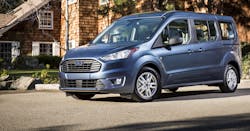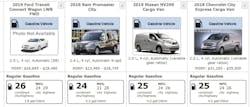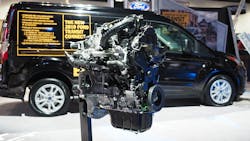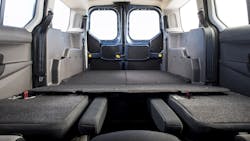Even before new diesel, Ford claims top mpg spot for Transit Connect
With its fresh-for-2019 redesigned Transit Connect compact van, depending on how you configure it, Ford has edged into the top slot for fuel economy among gasoline-engine vehicles in the segment. That's courtesy of the 2.0L engine Ford is now offering for the Transit Connect, which is paired to an 8-speed automatic.
When it comes in the Passenger Wagon model, the powertrain delivers an estimated 24 city/29 highway mpg and combined 26 mpg. It's slightly less for the Cargo Van variant with the same engine: 24 city/27 highway mpg and combined 25 mpg.
The new 2.0L gas engine, available for purchase now, is standard on the '19 Transit Connect Passenger Wagon and churns out 162 hp. and 144 lbs.-ft. of torque. The outgoing '18 model Transit Connect's larger 2.5L engine was more powerful and made 169 hp. and 171 lbs.-ft. of torque—nearly 19% torquier output on that latter spec—but with less fuel economy, at 20 city/27 highway mpg and combined 23 mpg.
A 2.5L will continue in the Transit Connect, however. Ford is offering a fleet-exclusive option for a 2.5L on the '19 Transit Connect Cargo Van, although it comes prepped either for compressed natural gas or propane autogas.
In other gasoline compact van options, there's the Ram ProMaster City, whose 2.4L gets an estimated 21 mpg around town and, thanks to an advanced 9-speed automatic, is just a click behind the Transit Connect at 28 highway mpg, settling at a combined 24 mpg. Nissan's NV200 compact—which Chevrolet offered wearing bowties up through model year 2018 but has discontinued—is good for 24 city/26 highway mpg and a combined 25 mpg with its 2.0L and continuously variable transmission.
Meanwhile, even more fuel economy is on the way for Ford's compact van in the form of the upcoming 1.5L EcoBlue turbo diesel arriving early next year. The OEM has been saying that little powerplant will be good for "at least" 30 highway mpg, and Ford engineers told Fleet Owner earlier this year the diesel should make around 120 hp and 200 lbs.-ft. of torque, though none of those figures are final.
So the EcoBlue will offer more torque and slightly more fuel economy than the 2.0L gas engine, but at the zap of costlier fuel and with another $1,995 tacked onto the MSRP for the option. If you want a diesel in a compact van, that current class-exclusive is your only choice.
Comparative value
But the 2.0L and its lower cost and solid fuel economy could be the overall value leader for the Transit Connect. Ford bills the Passenger Wagon with its available long wheelbase, which has a base MSRP of $26,845 before destination fees, as "one of the most affordable seven-passenger vehicles in the United States."
Ford has also been touting the Transit Connect passenger van as a sort of "magic bus" minivan alternative with a different style vibe and more maneuverability and versatility than those larger family and livery/people-carrying vans. The company has designed it to go between people- and cargo-hauling quickly, and an available trailer package is expected to give it 2,000 lbs. towing capacity.
How does the Transit Connect in its passenger-carrying flavor compare with the latest minivans Ford is hoping it can steal buyers away from? For starters, those aren't in the same segment, stacking up against this small though deceptively spacious blue-oval-wearing van that boasts some commercial-spec beefiness.
But a 2019 Honda Odyssey starts at $30,090 and has EPA estimated fuel economy of 19 city/28 highway mpg and combined 22 mpg with its 10-speed automatic; a 2019 Toyota Sienna starts at $31,115 for a base model and has an estimated 19 city/27 highway mpg and combined 22 mpg.
A Chrysler Pacifica starts with a base MSRP of $26,995, just above the Ford, and offers an estimated 19 city/28 highway mpg and combined 22 mpg (deduct 1 mpg around town without stop-start tech, but combined mpg is the same with either). Up the ante considerably to a base price of $39,995, and the 2019 Pacifica Hybrid offers a battery-only range of 33 miles at a soaring 84 highway/82 combined mpg equivalent when driving electrically, or 30 combined mpg overall for its gasoline and electric operation.
In the same Fiat Chrysler Automobiles family, the 2019 Dodge Grand Caravan comes in starting at $26,650 but with a 6-speed auto vs. the Pacifica's 9-speed auto. That gets the Dodge lower 17 city/25 highway mpg and 20 combined mpg estimates, though the Pacifica and Grand Caravan both have 3.6L gas engines under the hood.
All of those minivans by comparison are above 6,000 lbs. gross vehicle weight rating and into Class 2 territory except for the Sienna, which sneaks in just under at 5,995 GVWR—still more than 1,000 lbs. over the Transit Connect.
And if we've crossed into the Class 2 neighborhood, head just a few hundred pounds GVWR north to Mercedes-Benz's Class 2 "tweener" van, the Metris. Though larger and not in the same segment as the Transit Connect, its $26,570 starting MSRP makes it a healthy value contender. It's also got a 2.0L gasoline engine, only aspirated by a turbo to generate 208 hp. and 258 lbs.-ft. of torque.
So the Metris offers more brawn and less fuel economy than you'll find among compact vans and a bit more physical size, though still less than a large van. The Benz van gets an estimated 19 city/23 highway mpg and 21 combined mpg for the Cargo Van model and 21 city/24 highway mpg and combined 22 mpg for the Passenger Van.
About the Author
Aaron Marsh
Aaron Marsh is a former senior editor of FleetOwner, who wrote for the publication from 2015 to 2019.



